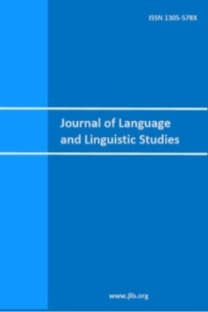Understanding foreign language teachers' practical knowledge: What's the role of prior language learning experience?
Öğretmenlerin pratik bilgileri, öğretmenlerin genel bilgisi, inanışları ve düşünceleri olarak kabul edilir (Borg, 2003), öğretmenlerin pratiklerinde gizlidir (Connelly & Clandinin, 1998), ve çeşitli öz geçmiş kaynakarıyla biçimlenir (Borg, 2003; Grossman, 1990; Meijer, Verloop, and Beijard, 1999). Bu makalede ilk olarak, dil öğretmenlerinin bilgisinin üç öz geçmiş kaynağından etkilendiği tartışılır: geçmişteki dil öğrenim deneyimleri, hizmet öncesi ve hizmet içi mesleki çalışmaları, ve öğretim deneyimleri. Ayrıca yazarın uzun süreli bir çalışmasından alınan vakalar arası bulgulardan, İngilizceyi yabancı dil olarak öğreten üç This paper was drawn from the author’s dissertation research.öğretmenin geçmişteki dil öğrenme deneyimleriyle ilgili bir tema sunulur. Bu yazı öğretmenlerin kendi bilgileri konusunda yapılan çalışmalara katılmalarının araştırmaya bilgi sağlarken aynı zamanda öğretmenlerin kendi farkındalığını nasıl arttırdığını da ele alır
Anahtar Kelimeler:
Yabancı dil öğretmenleri, İngilizce’yi yabancı dil olarak öğreten öğretmenler, öğretmenlerin pratik bilgisi, geçmişteki dil öğrenme deneyimleri, yabancı dil öğretmenlerinin gelişimi
Teachers’ practical knowledge is considered as teachers’ general knowledge, beliefs and thinking (Borg, 2003) which can be traced in teachers’ practices (Connelly & Clandinin, 1988) and shaped by various background sources (Borg, 2003; Grossman, 1990; Meijer, Verloop, and Beijard, 1999). This paper initially discusses how language teachers are influenced by three background sources: teachers’ prior language learning experiences, prior teaching experience, and professional coursework in pre- and in-service education. By drawing its data from the author’s longitidunal study, it also presents the findings of a cross-case theme emerged from the investigation of three English as a foreign language (EFL) teachers’ prior language learning experiences. The paper also discusses how the participation in studies on teachers’ knowledge raises teachers’ own awareness while it informs the research.
___
Ariogul, S. (2006). Exploring teacher knowledge base: A qualitative study of English as a foreign language (EFL) teachers’ practical knowledge in Turkey. Unpublished doctoral dissertation, Indiana University, Bloomington, IN.Breen, M.P. (1991). Understanding the language teacher. In R. Philipson, E. Kellerman, L. Selinker, M. Sharwood Smith & M. Swain (Eds.), Foreign/second language pedagogy research (pp. 213-233). Clevedon, UK: Multilingual Matters.
Breen, M. P., Hird, B., Milton, M., Oliver, R., & Thwaite, A. (2001). Making sense of language teaching: Teachers’ principles and classroom practices. Applied Linguistics, 22(4), 470-501.
Borg, S. (1998). Teachers’ pedagogical systems and grammar teaching: A qualitative study. TESOL Quarterly, 32(1), 9-35.
Borg, S. (1999). Studying teacher cognition in second language grammar teaching. System, 27, 19-31.
Borg, S. (2003). Teacher cognition in language teaching: A review of research on what
language teachers think, know, believe, and do. Language Teaching, 36(2), 81-109.
Cabaroglu, N., & Roberts, J. (2000). Development in student teachers’ pre-existing beliefs during a 1-year PGCE programme. System, 28, 387-402.
Carspecken, P. F. (1996). Critical ethnography in educational research: A theoretical and practical guide. London: Routledge.
Carter, K. (1990). Teachers’ knowledge and learning to teach. Teachers’ knowledge and learning to teach. In R. W. Houston (Ed.), Handbook of research on teacher education (pp. 292-310). New York: Macmillan.
Connelly, F. M., & Clandinin, D. J. (1988). Teachers as curriculum planners: Narratives of experience. New York: Teachers College Press.
Elbaz, F. (1981). The Teacher’s “practical knowledge”: Report of a case study. Curriculum Inquiry, 11(1), 43-71.
Elbaz, F. (1983). Teacher thinking: A study of practical knowledge. London: Croom Helm.
Feiman-Nemser, S. & Floden, R. E. (1986). The cultures of teaching. In: M. C. Wittrock (Ed.), Handbook of research on teaching (pp. 505–526). New York: Macmillan.
Freeman, D. (1991). “To make the tacit explicit”: Teacher education, emerging discourse, and conceptions of teaching. Teaching & Teacher Education, 7(5/6), 439-454.
Freeman, D., & Johnson, K. (1998). Reconceptualizing the knowledge-base of language teacher education. TESOL Quarterly, 32(3), 397-417.
Freeman, D. (2002). The hidden side of the work: Teacher knowledge and learning to teach. Language Teaching, 35, 1-13.
Golombek, P. (1998). A study of language teachers’ personal practical knowledge. TESOL Quarterly, 32(3), 447-464.
Grossman, P. L. (1990). The making of a teacher: Teacher knowledge & Teacher education. New York: Teachers College Press.
Grossman, P. L. (1991). What are we talking about anyway: Subject-matter knowledge of secondary English teachers. In J. Brophy (Ed.),Advances in Research on Teaching, Vol. 2 (pp. 245-264). Greenwich, CT: JAI Press, Inc.
Johnston, B., & Goettsch, K. (2000). In search of the knowledge base of language teaching: Explanations by experienced teachers. Canadian Modern Language Review, 56, 437- 468.
Lortie, D. (1975). Schoolteacher: A sociological study. Chicago: University of Chicago Press.
Meijer, P.C., Verloop, N., & Beijard, D. (1999). Exploring language teachers’ practical knowledge about teaching reading comprehension. Teaching & Teacher Education, 15, 59-84.
Meijer P., Verloop, N., & Beijard, D. (2001). Similarities and differences in teachers’ practical knowledge about teaching reading comprehension. Journal of Educational Research, 94(3), 171-184.
Nespor, J. (1987). The role of beliefs in the practice of teaching. Journal of Curriculum Studies, 19(4), 317-328.
Numrich, C. (1996). On becoming a language teacher: Insights from diary studies. TESOL Quarterly, 30(1), 131-149.
Peacock, M. (2001). Pre-service ESL teachers’ beliefs about second language learning: a longitudinal study. System, 29, 177-195.
Shulman, L. S. (1987). Knowledge and teaching: Foundations of the new reform. Harvard Educational Review, 57(1), 1-22.
Ulichny, P. (1996). What’s in a methodology? In D. Freeman & J. C. Richards (Eds.), Teacher learning in language teaching (pp. 178-196). Cambridge: Cambridge University Press.
Sibel ARIOĞUL, PhD. Foreign Languages Teaching Department, Faculty of Education,
Hacettepe University, Ankara, Turkey. Her research interests include teacher cognition,
foreign language teachers’ professional development, qualitative research methods, and critical literacy.
- ISSN: 1305-578X
- Yayın Aralığı: Yılda 4 Sayı
- Yayıncı: Hacettepe Üniversitesi
Sayıdaki Diğer Makaleler
(ELT ), Foreign Language Teaching (FLT )
Filiz Yalçın Tılfarlıoğlu Ali Rıza Öztürk
Filiz TILFARLIOĞLU, Ali ÖZTÜRK
Acquisition of Latin Roots with Implications for EAP
Buğra Zengin, Ali Doğan, Suna Akalın
The Eastern Origin of English Words
Patterns of Idiomacity in English, Italian and Romanian
Türkiye’de Halkın Yabancı Dil İle İlgili Algıları
Negotiating the Meaning of Grammatical Constructions With Some English Confusables
